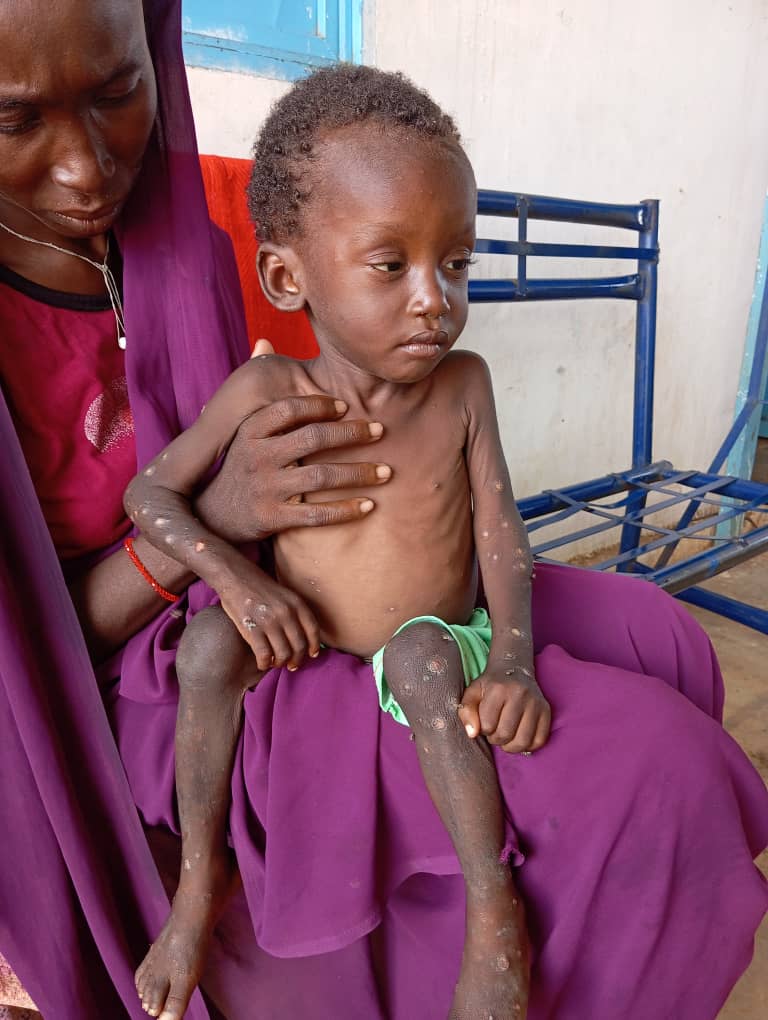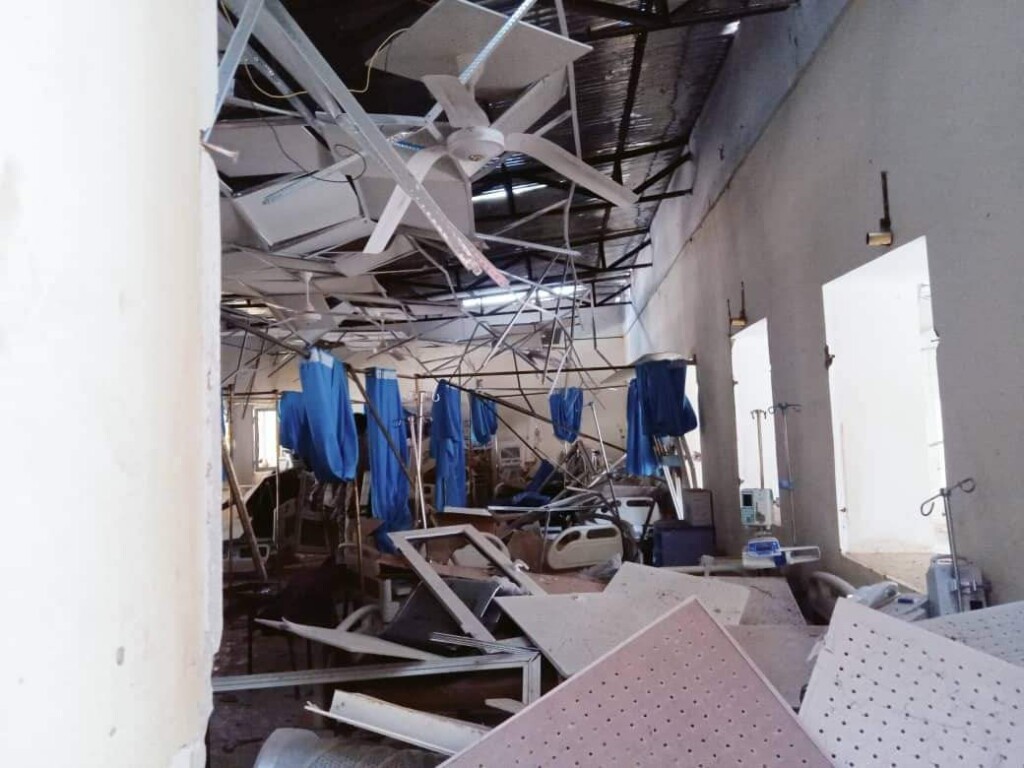The El Geneina Teaching Hospital in West Darfur (Photo: RD)
Sudan Media Forum Joint Editorial Room
Many diseases have been gripping Sudan for months. A new variant of monkeypox has been reported in the country, though no information is available about its spread, as a significant part of Sudan is excepted from epidemiological monitoring. The federal Ministry of Health considers the areas controlled by the Rapid Support Forces (RSF) ‘unreachable’ and has neither provided medical aid nor financial support to the health ministries in these areas.
Medical monitoring is of course of great importance because it contributes to better disease prevention and control. Through the data collected, countries can identify their priorities and develop targeted interventions to address the course of the epidemic.
Other diseases that are gripping Sudan for months, are, most notably, cholera, conjunctivitis, bacterial dermatitis, scabies, haemorrhagic fevers, tuberculosis, hepatitis, in addition to polio, measles and other children’s diseases. Furthermore, famine is reported in several regions.
During the war that erupted between the Sudanese Armed Forces (SAF) and the paramilitary Rapid Support Forces (RSF) in mid-April last year, the latter took full or partial control of 10 of the 18 Sudanese states. This means that the Sudanese health authorities are unable to access and monitor the situation in these areas.
Leila Hamedelnil, working for the Emergency Department of the federal Ministry of Health in Port Sudan, Red Sea state, told Radio Dabanga earlier that the ministry classifies the states of Sudan into three levels since the start of the war: accessible, difficult to reach, and unreachable.
The RSF took control of four of the five Darfur states (as well as a part of North Darfur) in the end of last year, and have set up governments in these states with the cooperation of native administration leaders*. This means that the health ministries of East, South, Central, and West Darfur fall within the third category set by the federal health ministry.
The RSF occupies several parts of North Darfur except its capital El Fasher, which is still mainly under control of the SAF, and Tawila and neighbouring areas, including Jebel Marra, that is controlled by combatants of the mainstream Sudan Liberation Movement, headed by Abdelwahid Nour.
In Kordofan, the RSF controls all North Kordofan localities except Sheikan. In West Kordofan, only En Nehoud and Wad Banda are still in the hands of the army.
The RSF further occupies large parts of Khartoum, Khartoum North (Khartoum Bahri), and Omdurman. In El Gezira, south of Khartoum, the RSF occupy all localities except for El Managil and El Gurashi. The RSF seized neighbouring Sennar in June this year.
As for vaccination campaigns, Sudan’s federal Minister of Health Haisam Ibrahim in previous statements attributed the emergence of polio in the country to the decrease in vaccination campaigns in the country, especially in the areas controlled by the RSF.
In August, the Ministry of Health conducted a polio immunisation campaign in eastern Sudan (Red Sea state, Kassala, El Gedaref) and northern Sudan (Northern State and Nile River state), and said it would extent the immunisation to White Nile and Blue Nile states later. The ministry reported “difficulties” in the delivery of vaccines to the areas controlled by the RSF.

Darfur
The health ministries of East, South, Central, and West Darfur all complain about the inability to communicate with the federal Ministry of Health in Port Sudan in order to coordinate their efforts to confront infectious diseases.
Abdelsalam Mustafa, director of the West Darfur Ministry of Health told Radio Dabanga that “we are ready to provide the federal ministry with medical reports, if they ask us.
“We have no problem in cooperating with any party, whether the ministry or an organisation, as long as we receive support for the people’s health care in West Darfur,” he said.
“Health care should not be linked to a political, security, regional, ethnic or other situation,” Mustafa added. “Medical assistance is part of humanitarian aid that should be available even during wars.”
He said he hopes that the opening of the Adré border crossing with Chad “will also allow humanitarian organisations to intervene and improve the health situation. “In this way, we could also send samples of diseases with returning trucks via Chad, to Port Sudan or to other Sudanese or non-Sudanese cities.”
Mustafa noted that more than 144 medical facilities in the state closed their doors due to the total or partial collapse. “We were able to restore 40 per cent of the sector, but this is of course far from enough, in particular with the absence of new supplies for more than 16 months.”
He reported the spread of watery diarrhoea, intestinal diseases, and eye infections in West Darfur.
The situation in South Darfur is not much different. “If we suspect an infectious disease in an area, we only take basic precautions, as we do not have any technical equipment to determine the type of the disease,” an emergency official at the South Darfur Ministry of Health in Nyala, capital of South Darfur, told Radio Dabanga yesterday.
“We only have instantaneous reagents for the water testing laboratory in Nyala in which water pollution is confirmed or denied. But we cannot determine the type of pollution anymore, due to the damage done by the fighting to the Nyala Public Health Laboratory,” the medic, who preferred not to be named, said.
“Before the war, we used to take samples and send them to the National Stack Laboratory in Khartoum, or to the regional laboratory in Johannesburg, South Africa. Now, there is no way to do this, so if there is any suspicion about a disease in a certain area, it is treated as a positive case and we give the green light to deal with it if possible.”
The Central Darfur Health Ministry in Zalingei has adopted “traditional mechanisms in following up and investigating diseases, as the entire medical infrastructure, including laboratories, completely collapsed. In addition, many medical staff members fled the state,” Mohamed El Amin Rizgallah, the head of the ministry explained to Radio Dabanga.
“What complicates the situation is the lack of coordination between the state and federal ministries of health, which also means that we do not have a budget anymore.”
Rizgallah reported the emergence of diseases such as ophthalmia and watery diarrhoea, and the spread of tuberculosis, in addition to the growing number of malnourished people. “We are facing all these problems in the absence of the federal Ministry of Health,” he said, and expressed his gratitude to Médecins Sans Frontières (MSF) and the World Relief organisation “that work together with the ministry in some areas of emergency”.
He said that “the ministry, in coordination with MSF-Spain, has been able to rehabilitate the Zalingei Teaching Hospital by 70 per cent after it “entirely collapsed” due to fierce fighting for the control of the city. “Nine other hospitals need urgent repair as well.
The Central Darfuri health official called on the federal Health Ministry to provide budgets again, and on international organisations “to intervene to save the health situation in the state”.

‘No parallel health system’
As for the states that are difficult to reach, Leila Hamedelnil of the federal Health Ministry’s Emergency Department told Radio Dabanga that “the ministry continuously receives reports from these states.
“The early warning system, activated in the case of disasters and emergencies, enables the ministry to obtain reports from the states by 85 per cent, whether through early warning, grassroots community monitoring, or youth surveillance systems.”
In previous statements, the federal Minister of Health Haisam Ibrahim called on relief organisations “to only work through the competent authorities and not to create a parallel health system that could cause damage”.
He explained that “some organisations tried to bring in medicines without the knowledge of the government” and said that the de facto government in Port Sudan “addressed the United Nations about its rejection of any parallel health system”.
Ibrahim said that “50 per cent of Sudan does not receive humanitarian aid because of insecurity”, and accused the RSF of intercepting routes to Darfur, Kordofan, El Gezira, Sennar, and the Blue Nile and White Nile states. He mentioned the delivery of medicines through airdrops to the states of Darfur and over land to South Kordofan.
He stressed the importance of joint coordination with the government to deliver medical services to areas under RSF control.
This report is published simultaneously on the platforms of media and press institutions and organisations that are members of the Sudan Media Forum. Eurasia




